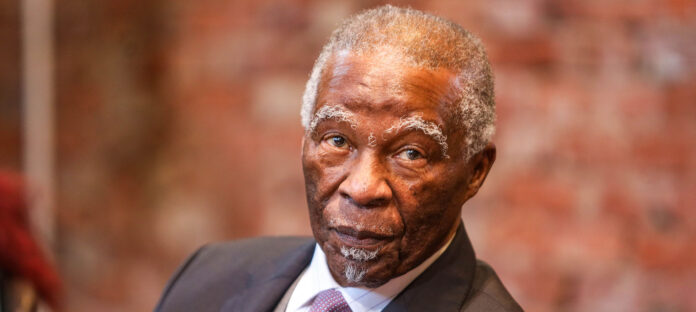The Pretoria High Court has dismissed an application by former president Thabo Mbeki and former justice minister Brigitte Mabandla to intervene in a case brought by apartheid victims and their families seeking justice for the state’s alleged suppression of Truth and Reconciliation Commission (TRC) prosecutions.
In a scathing but measured judgment handed down on Friday morning, Judge Anthony Millar ruled that while Mbeki and Mabandla may feel their reputations are at stake, they have no direct legal interest in the outcome of the main application, which seeks constitutional damages and a declaratory order against the government, not them personally.
“It suffices to state that for Mr Mbeki and Ms Mabandla, they ‘stand alone’ in these motion proceedings in that the only way that they would be able to assert any legal interest or vindicate any right arising from any order that would be granted is for them to intervene,” said Millar.
“Mr Mbeki and Ms Mabandla are named in the founding affidavit. It is their case that serious allegations are preferred against them.”
Legal threshold requirement not met
However, the court found that the two applicants failed to meet the legal threshold required for such intervention.
“It is not enough whether a person has an interest in a finding or in certain reasons for an order. The interest must be in the order or the outcome of the litigation,” the court quoted from the Constitutional Court’s precedent in Lebea v Menye.
Mbeki and Mabandla claimed that serious accusations in the main application, some taken from academic books, made them look bad and could lead to possible legal trouble or blame for the political interference that delayed justice after the TRC.
They sought to clarify the situation and protect themselves from potential findings that might damage their reputation.
But the court ruled that no such direct findings were being sought against them.
“Neither Mr Mbeki nor Ms Mabandla are specifically named as having directly acted in any way to subvert or prevent the TRC investigations or prosecutions.
“References to them are by virtue of the offices that they held and by way of inference,” Millar said.
Millar stated that the main application totals 1 077 pages, including a 259-page founding affidavit, 677 pages of annexures, and 241 pages of supporting affidavits.
Book references dismissed
He said Mbeki is mentioned 21 times: 10 official records, four on possible prosecution, and seven from books, while Mabandla appears in six references, five relating to official acts and one about a memorandum she did not answer.
Millar dismissed the book references as mere hearsay.
“Regarding Mr Mbeki, besides the books, the contents of which are both hearsay and which set out a narrative indicative of a conspiracy to defeat the investigation and prosecution of TRC cases, there are no direct allegations made by the [Fort, one of the Cradock Four victims of apartheid brutality] Calata applicants against him. There are also no direct allegations made against Ms Mabandla,” ruled Millar.
“No matter how compelling the narrative may be, any direct references that appear in the extracts from the two books are hearsay.”
Importantly, Millar found that the courts had already made strong decisions confirming that there was political interference in TRC cases, especially in the Rodrigues v NDPP case, and those decisions remain valid regardless of who was involved.
“Accordingly, it cannot be an issue that there was political interference in the prosecution of the TRC cases. Our courts have found this to be so, and those findings stand and are binding.”
Constitutional damages
The main application, brought by the Calata family and others, seeks constitutional damages and the establishment of a trust for victims whose TRC-referred cases were never prosecuted.
While the government initially opposed the relief, it later conceded to the establishment of a commission of inquiry, leaving only the damages claim and declaratory relief for court determination.
Mbeki and Mabandla are expected to appear before that commission to respond to the broader allegations.
“Mr Mbeki and Ms Mabandla have no direct and substantial interest in the granting of any declaratory order against the government respondents.
“The appropriate forum for them to ‘tell their side of the story’ is at the commission of enquiry.”
Despite rejecting their application, the court declined to award costs against them, acknowledging the gravity of the issues raised.



